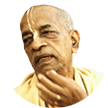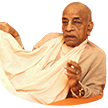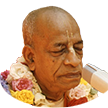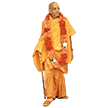Asrama - an essential subject: Difference between revisions
(Created page with "Category:Essential Subjects <!----------------------- edit below this line -----------------------> <!------------------------ begin introduction text below --------------...") |
(Vanibot #0041: Moves Choose Another box to the end) |
||
| Line 2: | Line 2: | ||
<!----------------------- edit below this line -----------------------> | <!----------------------- edit below this line -----------------------> | ||
<!------------------------ begin introduction text below ------------------------> | <!------------------------ begin introduction text below ------------------------> | ||
The brāhmaṇas are produced from the mouth of the Lord, and the kṣatriyas are produced from the chest or arms of the Lord. If the different castes or social sections, although apparently differently occupied in different activities, nevertheless act in full cooperation, then the Lord is pleased. This is the idea of the institution of four varṇas and four āśramas. If the members of different āśramas and varṇas cooperate fully in Kṛṣṇa consciousness, then society is well protected by the Lord, without doubt. | |||
Srila Prabhupada's books, lectures, conversations and letters offer a comprehensive presentation of this essential subject as seen in the Vaniquotes '''[[Vaniquotes:Category:Asrama|Asrama]]''' category. An introduction from his books is given below in the following | Srila Prabhupada's books, lectures, conversations and letters offer a comprehensive presentation of this essential subject as seen in the Vaniquotes '''[[Vaniquotes:Category:Asrama|Asrama]]''' category. An introduction from his books is given below in the following 8 quotes. | ||
<!-------- end introduction text and don't touch next three lines ---------> | <!-------- end introduction text and don't touch next three lines ---------> | ||
== Quotes from Srila Prabhupada's books == | == Quotes from Srila Prabhupada's books == | ||
<!----------------- edit quote boxes below this line -----------------> | <!----------------- edit quote boxes below this line -----------------> | ||
{{VaniQuotebox| | {{VaniQuotebox|In the varnasrama system the student goes to the asrama of the master to take lessons from him and serve him, even as a menial servant|In the varṇāśrama system the student goes to the āśrama of the master to take lessons from him and serve him, even as a menial servant. The troubles o the student are at once mitigated when he attains transcendental knowledge in terms of his relation with Śrī Kṛṣṇa, the Personality of Godhead. As the white clouds no longer bear the burden of water in the autumn sky, the student finds that the troubles of drawing water for the master become a burdenless job if the student, by the grace of his master, attains to spiritual knowledge. '''(Light of the Bhāgavata, Chapter 31)'''}} | ||
{{VaniQuotebox|According to the Tattvavadis, the best process for achieving the highest goal of life is to execute the duties of the four varnas and asramas|According to the Tattvavādīs, the best process for achieving the highest goal of life is to execute the duties of the four varṇas and āśramas. In the material world, unless one is situated in one of the varṇas (brāhmaṇa, kṣatriya, vaiśya or śūdra) one cannot manage social affairs properly to attain the ultimate goal. '''(Caitanya-caritāmṛta, Madhya-līlā 9.258)'''}} | {{VaniQuotebox|According to the Tattvavadis, the best process for achieving the highest goal of life is to execute the duties of the four varnas and asramas|According to the Tattvavādīs, the best process for achieving the highest goal of life is to execute the duties of the four varṇas and āśramas. In the material world, unless one is situated in one of the varṇas (brāhmaṇa, kṣatriya, vaiśya or śūdra) one cannot manage social affairs properly to attain the ultimate goal. '''(Caitanya-caritāmṛta, Madhya-līlā 9.258)'''}} | ||
| Line 16: | Line 15: | ||
{{VaniQuotebox|According to Vedic injunction, women are not allowed to undergo the purificatory process of initiation by the sacred thread, nor are they allowed to live as brahmacarinis in the asrama of the spiritual master|According to Vedic injunction, women are not allowed to undergo the purificatory process of initiation by the sacred thread, nor are they allowed to live as brahmacāriṇīs in the āśrama of the spiritual master, nor are they advised to undergo the strict disciplinary procedures, nor are they very expert in discussing the philosophy of self-realization. And by nature they are not very pure, nor are they very much attached to auspicious activities. '''(Kṛṣṇa Book, Chapter 23)'''}} | {{VaniQuotebox|According to Vedic injunction, women are not allowed to undergo the purificatory process of initiation by the sacred thread, nor are they allowed to live as brahmacarinis in the asrama of the spiritual master|According to Vedic injunction, women are not allowed to undergo the purificatory process of initiation by the sacred thread, nor are they allowed to live as brahmacāriṇīs in the āśrama of the spiritual master, nor are they advised to undergo the strict disciplinary procedures, nor are they very expert in discussing the philosophy of self-realization. And by nature they are not very pure, nor are they very much attached to auspicious activities. '''(Kṛṣṇa Book, Chapter 23)'''}} | ||
{{VaniQuotebox|All the asramas are recognized for spiritual progress, and therefore although the grhastha-asrama gives a kind of license for sex life for a certain time, it does not allow unrestricted sex life| All the āśramas are recognized for spiritual progress, and therefore although the gṛhastha-āśrama gives a kind of license for sex life for a certain time, it does not allow unrestricted sex life. Therefore, in gṛhastha life also, there is no illicit sex. A gṛhastha should not accept a woman for sexual enjoyment. Wasting semen is also illicit sex | {{VaniQuotebox|All the asramas are recognized for spiritual progress, and therefore although the grhastha-asrama gives a kind of license for sex life for a certain time, it does not allow unrestricted sex life| All the āśramas are recognized for spiritual progress, and therefore although the gṛhastha-āśrama gives a kind of license for sex life for a certain time, it does not allow unrestricted sex life. Therefore, in gṛhastha life also, there is no illicit sex. A gṛhastha should not accept a woman for sexual enjoyment. Wasting semen is also illicit sex. '''(Śrīmad-Bhāgavatam 7.12 Summary)'''}} | ||
{{VaniQuotebox|Bharadvaja: He is one of the seven great rsis and was present at the time of the birth ceremony of Arjuna. The powerful rsi sometimes undertook severe penances on the shore of the Ganges, and his asrama is still celebrated at Prayagadhama|Bharadvāja: He is one of the seven great ṛṣis and was present at the time of the birth ceremony of Arjuna. The powerful ṛṣi sometimes undertook severe penances on the shore of the Ganges, and his āśrama is still celebrated at Prayāgadhāma. It is learned that this ṛṣi, while taking bath in the Ganges, happened to meet Ghṛtacī, one of the beautiful society girls of heaven, and thus he discharged semen, which was kept and preserved in an earthen pot and from which Droṇa was born. '''(Śrīmad-Bhāgavatam 1.9.6-7 )'''}} | {{VaniQuotebox|Bharadvaja: He is one of the seven great rsis and was present at the time of the birth ceremony of Arjuna. The powerful rsi sometimes undertook severe penances on the shore of the Ganges, and his asrama is still celebrated at Prayagadhama|Bharadvāja: He is one of the seven great ṛṣis and was present at the time of the birth ceremony of Arjuna. The powerful ṛṣi sometimes undertook severe penances on the shore of the Ganges, and his āśrama is still celebrated at Prayāgadhāma. It is learned that this ṛṣi, while taking bath in the Ganges, happened to meet Ghṛtacī, one of the beautiful society girls of heaven, and thus he discharged semen, which was kept and preserved in an earthen pot and from which Droṇa was born. '''(Śrīmad-Bhāgavatam 1.9.6-7)'''}} | ||
{{VaniQuotebox|Caturmasya should be observed by all sections of the population. It does not matter whether one is a grhastha or a sannyasi. The observance is obligatory for all asramas|Cāturmāsya should be observed by all sections of the population. It does not matter whether one is a gṛhastha or a sannyāsī. The observance is obligatory for all āśramas. The real purpose behind the vow taken during these four months is to minimize the quantity of sense gratification. This is not very difficult. In the month of Śrāvaṇa one should not eat spinach, in the month of Bhādra one should not eat yogurt, and in the month of Āśvina one should not drink milk. '''(Caitanya-caritāmṛta, Madhya-līlā 4.169)'''}} | {{VaniQuotebox|Caturmasya should be observed by all sections of the population. It does not matter whether one is a grhastha or a sannyasi. The observance is obligatory for all asramas|Cāturmāsya should be observed by all sections of the population. It does not matter whether one is a gṛhastha or a sannyāsī. The observance is obligatory for all āśramas. The real purpose behind the vow taken during these four months is to minimize the quantity of sense gratification. This is not very difficult. In the month of Śrāvaṇa one should not eat spinach, in the month of Bhādra one should not eat yogurt, and in the month of Āśvina one should not drink milk. '''(Caitanya-caritāmṛta, Madhya-līlā 4.169)'''}} | ||
{{VaniQuotebox| | {{VaniQuotebox|Guru's asrama|In the system of varṇāśrama-dharma, which is the beginning of actual human life, small boys after five years of age are sent to become brahmacārī at the guru's āśrama, where these things are systematically taught to boys, be they king's sons or sons of ordinary citizens. The training was compulsory not only to create good citizens of the state, but also to prepare the boy's future life for spiritual realization. '''(Śrīmad-Bhāgavatam 1.5.24)'''}} | ||
Guru's asrama|In the system of varṇāśrama-dharma, which is the beginning of actual human life, small boys after five years of age are sent to become brahmacārī at the guru's āśrama, where these things are systematically taught to boys, be they king's sons or sons of ordinary citizens. The training was compulsory not only to create good citizens of the state, but also to prepare the boy's future life for spiritual | |||
{{VaniQuotebox|He is therefore the spiritual master of all the varnas (brahmana, ksatriya, vaisya and sudra) and all the asramas (brahmacarya, grhastha, vanaprastha and sannyasa)|He is therefore the spiritual master of all the varṇas (brāhmaṇa, kṣatriya, vaiśya and śūdra) and all the āśramas (brahmacarya, gṛhastha, vānaprastha and sannyāsa). Since he is understood to be the most advanced devotee, he is called paramahaṁsa-ṭhākura. Ṭhākura is a title of honor offered to the paramahaṁsa. '''(Caitanya-caritāmṛta, Antya-līlā 7.12)'''}} | {{VaniQuotebox|He (the true acarya) is therefore the spiritual master of all the varnas (brahmana, ksatriya, vaisya and sudra) and all the asramas (brahmacarya, grhastha, vanaprastha and sannyasa)|The true ācārya, the spiritual master of the entire world, must be considered an incarnation of Kṛṣṇa's mercy. Indeed, he is personally embracing Kṛṣṇa. He is therefore the spiritual master of all the varṇas (brāhmaṇa, kṣatriya, vaiśya and śūdra) and all the āśramas (brahmacarya, gṛhastha, vānaprastha and sannyāsa). Since he is understood to be the most advanced devotee, he is called paramahaṁsa-ṭhākura. Ṭhākura is a title of honor offered to the paramahaṁsa. '''(Caitanya-caritāmṛta, Antya-līlā 7.12)'''}} | ||
<!----------------- edit quote boxes above this line -----------------> | <!----------------- edit quote boxes above this line -----------------> | ||
| Line 31: | Line 29: | ||
'''Asrama- [[Vaniquotes:Category:Asrama|explore more within this category]]'''. | '''Asrama- [[Vaniquotes:Category:Asrama|explore more within this category]]'''. | ||
{{EsentialSubjectTotal}} | {{EsentialSubjectTotal}} | ||
<div style="float:left;"> | |||
{{EssentialSubjectnav}} | |||
</div> | |||
__NOTOC__ | __NOTOC__ | ||
__NOEDITSECTION__ | __NOEDITSECTION__ | ||
Latest revision as of 15:48, 22 November 2020
The brāhmaṇas are produced from the mouth of the Lord, and the kṣatriyas are produced from the chest or arms of the Lord. If the different castes or social sections, although apparently differently occupied in different activities, nevertheless act in full cooperation, then the Lord is pleased. This is the idea of the institution of four varṇas and four āśramas. If the members of different āśramas and varṇas cooperate fully in Kṛṣṇa consciousness, then society is well protected by the Lord, without doubt.
Srila Prabhupada's books, lectures, conversations and letters offer a comprehensive presentation of this essential subject as seen in the Vaniquotes Asrama category. An introduction from his books is given below in the following 8 quotes.
Quotes from Srila Prabhupada's books
Asrama- explore more within this category.
Vanipedia has now over 903 introductory articles compiled from Srila Prabhupada's books under the series titled Essential Subjects. All these articles can be seen in the Table of Content on the right side of this article and also here in this Umbrella Category. Browse through them to relish the breadth and depth of Srila Prabhupada's teachings - There is a subject for everyone.







